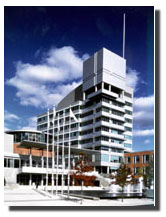
I am indebted (again) to Ikram Saeed for delving further in my links to yesterday's blog. I am definitely going to have to check out the National Archives of Canada, and not just as research for The Young City. For all my moaning about the effectiveness of the Internet as a library (or lack thereof), this is a good antidote.
Anyway, Ikram catches something I missed: a document of all the names suggested for Berlin when it was decided to rename it. There are some weird ones, with Ikram picks out: names pumping Canadian nationalism (Canadia, Cadac, Canario, Kannata, Panada), names pumping British Imperialism (Anzac, Empire City, Imperial City, Imperator, Bretania) and just plain weird stuff (Renoma, Unison, Patoria, Cosmos -- Cosmos? Why not just rename us Romulus and give us the guaranteed income of a Star Trek convention year after year?).
Then there is the person who had the gall to suggest that I live in Uranus, Ontario. Yes, Bart Simpson was alive and well in 1917. The tourist department years afterward would be campaigning for another renaming. Consider the slogans: "You are now entering Uranus!" "Come and see me in Uranus!" It doesn't even have the subtlety of Climax, Saskatchewan.
I, however, am intrigued by the attempts to keep a name that has some local resonance; names like Chicopee (a settlement in the area), Beneby (after Benjamin Eby, one of the original settlers), Woolwich (Woolwich Township is in Waterloo County), Benton (original settler), Brock and Brockton. These were, at least, a sign that some people had a sense of where Berlin had come from, and wanted to keep that connection.
English Ontario dates back to 1793, the arrival of the loyalists from the American Revolution and the founding of the British colony of Upper Canada. Some of our cities get their names from the fact that Upper Canada's first governor-general, John Graves Simcoe, realized that England, when flipped onto its side, looked a lot like a map of Ontario. This is one reason why the cities of London, Toronto (York) and Kingston are where they are in relation to each other, and even why London, Ontario has its own Thames river. However, much of our municipal picture was set in 1849, under the Baldwin Act, which set up the province's city and county structure.
With that one act, the entire province was carved up and named. And, at the time, many of the names commemorated the British victories and British heroes from twenty years before. Waterloo County was named at this time, after Britain's final victory over Napoleon. Neighouring Wellington County was named after you-know-who. Wellesley Township in Waterloo County is named after a British general. The Town of Oakville has swallowed the township it resided in, but echoes of that township can be heard in the form of Trafalgar Road. There are no similar hints of Nelson Township, now the City of Burlington.
Napoleonic-era names dot Waterloo region. Brock and Brocton were attempts to harken back to that. Sir Issac Brock never fought in the Napoleonic Wars (he was killed fending off the American invaders at the Battle of Queenston Heights), but he was contemporary. The name "Brock" came within a couple of dozen votes from beating Kitchener in the renaming referendum; it's not as fancy, and it would have confused the heck out of anyone seeking to attend Brock University (it's in Niagara Region), but it had that connection with the rest of Waterloo County. Lord Kitchener, on the other hand, was a British general of the early 20th century, killed partway through World War I.
In the early 1990s, as the 75th anniversary of Kitchener's renaming approached, along with the opening of the city's new City Hall, a minor controversy erupted as some members in the community campaigned to have the city re-renamed Berlin, to right that "ancient wrong". Detractors suggested that this would be insulting to the thousands of East European immigrants who had come to the city since the Second World War, and proponents fought right back with stories of how Lord Kitchener himself ran concentration camps in the Boer War. There were no riots; all of the shouting was contained in the letters to the editor section of the KW Record, but the dueling historical atrocities game got a little silly, and the issue went away when Kitchener City Hall opened, its "borrowed" name intact.
Intriguingly, there were suggestions that Kitchener not be re-renamed Berlin, but something else -- something more in tune with the history of the area's settlement. BenEby, perhaps? Benton? Or perhaps Sandhills, which was what Kitchener was named before it was Berlin?
Names are not only powerful, they are connections. They are links to our past that live on long after the people the names are named after are forgotten. A badly placed name, a name without a connection, doesn't feel right. It sticks out. It doesn't describe the community.
Given time, however, a name will stick. I live in Kitchener, Ontario. That's my city's name, and my city is what I picture when that name is whispered in my ear.
Names Considered in the 1992 Proposed Renaming of the City of Kitchener
Michener: After Roland Michener, a former Governor-General of Canada, who had died a year beforehand. In the words of the proponent: "this way, you could commemorate someone who was truly great, and you only have to change one letter in the city's name" (that, and you have to admit that you can't spell worth a dime)
Elvis: "This way, we show our respect for a cultural icon, and consider how much more sense our cultural institutions make. The Kitchener Memorial Auditorium becomes the Elvis Memorial Auditorium!"
Napoleon: The little city with the big complex. Actually, since all of the other generals of Waterloo had been honoured, why not finally honour the great antagonist?
As I said, it must have been a slow news season. Things did get a little silly.